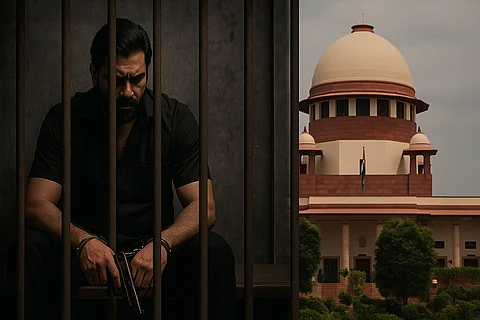
- Latest Legal News
- News
- Dealstreet
- Viewpoint
- Columns
- Interviews
- Law School
- Legal Jobs
- हिंदी
- ಕನ್ನಡ

The Supreme Court on Thursday expressed serious concern over the pendency of 288 criminal trials against alleged gangsters in the National Capital Territory (NCT) of Delhi, noting that there exists a significant delay between the framing of charges and commencement of evidence in these cases. [Mahesh Khatri Bholi v. State NCT of Delhi]
A Bench of Justices Surya Kant and Joymalya Bagchi was hearing a plea of a man who was described in court as a hardened criminal, with 55 cases previously registered against him. The petitioner had sought bail in a case involving offences under Section 307 of the Indian Penal Code IPC and the Arms Act. The petitioner
Referring to an additional affidavit placed on record, Justice Kant noted that there are 288 pending cases in the NCT of Delhi, and that in 180 of those cases, charges are yet to be framed.
It was further highlighted that only 25 per cent of the cases had reached the stage of commencement of prosecution evidence.
“It is candidly acknowledged that there is a gap of 3–4 years between framing of charges and commencement of evidence examination,” the Court recorded.
The judges said that the scale of pending trials demanded urgent structural reforms. Justice Kant observed,
“While the High Court will never have any objection to provide speedy trial by designating special courts, this can only happen if Union and Delhi government resolve to introduce a mechanism like fast track courts for trial of such cases.”
He suggested that additional posts of judicial officers could be created or a separate ad hoc cadre be formed to try such cases. The Court also said that infrastructural facilities and secretarial assistance must be provided for these special courts.
The Bench further noted that gangster-related cases required uninterrupted trial schedules to ensure timely justice.
“It goes without saying that keeping 288 trials pending against gangsters etc, there has to be appropriate strength of courts so that cases can be distributed and trials can be heard on day to day basis,” Justice Kant said.
He also flagged the need for directions at the appropriate stage to ensure efficiency in the process, including compensation for counsels' appearances, dispensation of adjournments and fixed timelines for framing of charges or filing of chargesheets.
Justice Bagchi added that delays were being exploited.
“Each and every trial is delayed to win over witness and get acquitted. That is the game plan,” he said.
During the hearing, Justice Kant pointed to the deteriorating law and order situation beyond Delhi.
“In the NCR, just go out of geographical belt of Delhi and see what is happening in Faridabad, Gurgaon etc. A man was arrested from Ghaziabad who committed a murder in Panipat. There should be no misplaced sympathy for these gangsters. Society needs to get rid of them."
The Bench also referred to the example of Andhra Pradesh, where the State had created special courts with additional infrastructure to deal with serious cases.
Noting that the issue now required a broader institutional response, the Bench issued notice to the Union of India through the Secretary, Ministry of Home Affairs and to Solicitor General Tushar Mehta.
The matter will be taken up again after four weeks.